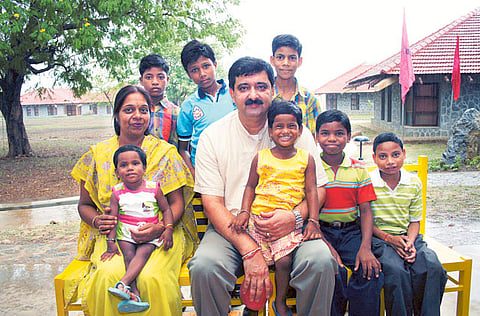A caring family for 1m children
Siddhartha Kaul is first Indian appointed president of SOS village

New Delhi: Siddhartha Kaul is the first Indian to be appointed global president of SOS Children’s Villages International, the NGO supporting children in need.
Founded by Hermann Gmeiner in 1949 in Austria, the SOS Children’s Villages are now active in more than 130 countries. Globally, seven million people provide money for its children.
In India, it has been functioning for the last five decades. While the Unicef data shows that more than 20 million children need help and poverty keeps increasing the numbers, 85 per cent of the money comes from outside the country.
In wake of this, though Siddhartha faces an uphill task, he is not disillusioned. Following the footsteps of his father J.N. Kaul, who used the expression ‘Bring Home a Child’, he says, “This remains my inspiration.”
He speaks to Gulf News in an exclusive interview.
Is it correct that your father started India’s operations of the first SOS Children’s Village?
Yes. It began when Gmeiner came to India in 1963. He discussed the idea with then Prime Minister Pandit Jawaharlal Nehru and his daughter Indira Gandhi, who was then Chairperson of the Indian Council for Child Welfare. Indira realised that it needed somebody with a strong will to take it up. And since my father had worked with her on various projects, he was entrusted with the task.
The first village came into being in Greenfields, Faridabad, on the outskirts of Delhi and our family started living there. Children’s issues were part of family discussions and during my growing up years, I shared a lot of time with children and mothers at the Village. All this had a strong influence on me and helped shape my thinking.
Even while pursuing studies, were you in any way associated with it?
I was part of various activities including teaching children Mathematics and English. During my vacations I led summer camps for children. Basically, I played the role of an elder brother.
As the first Indian to be appointed global president, what are your long-term plans?
My aim is to provide a caring family environment for 1 million children by the end of the decade, keeping in mind that quality supersedes quantity. I know it will be a major task to achieve, but supporters have responded to our work with tremendous faith for the last 63 years and we seek their continued help.
What challenges do you see in front?
While we have done considerable good work regarding children, the same quality work has not happened with young adults. This is especially so in countries having limited job and social opportunities. So, we need to focus in this area.
Another challenge is on the economic front. Until now, donors in Northern and Central Europe have been providing majority of finances, but in the current financial scenario, this is becoming tough. Many westerners wonder why people from the fast developing nations, including India, do not support their own children. So, to raise funds within the Brics countries [Brazil, Russia, India, China and South Africa] would be a continuous challenge in the next 5 to 10 years.
Why do Indians shy away from contributing to the deserving causes, even though they willingly donate huge amounts for religious purposes?
The belief in the Indian psyche is that by appeasing the Gods their problems would get solved. But a remarkable shift is now seen as the younger generation is keen to address the problems in the society and are identifying with development causes. My humble request to people is to help a child growing up in an SOS Village (in India) by contributing a mere $10 to $18 a month for his/her welfare and education.
Do these Villages also work as adoption centres?
We acknowledge adoption as an appropriate care solution for children who have lost their parents or have no family willing to take care of them. Since adoption and its follow-up is a task that requires expertise, we leave it to the specialised agencies. In some countries though, it is part of our services.
Do you feel, instead of supporting, India has failed its children in many ways?
I will not say failed, but we could have done better. The number of children needing help in India today is the largest in the world. The social support structure is very weak and we have a long way to go to help them. A great number of children are ill-treated and there is an organised crime against them. In the recently released Child Development Index, India’s position has fallen by 12 places. The number of children that continue education beyond primary schools is still far from satisfactory. Also, the models providing family-like care to children, who have lost their biological families, needs wider acceptance by the government and development agencies.
What in your opinion could be the reason that maximum contribution to NGOs comes from individuals?
I think individuals are able to connect and identify with a cause much easily. It is simple for them to choose where they wish to contribute. Also, if an individual has the possibility to interact with an NGO dealing with the cause he believes in, he can promptly take a decision rather than wait for his organisation’s approval.
While interacting with children, what common issues do you find the country has been unable to understand and overcome?
For children and young adults, two issues are the most common. One is, emotional support, which they look for within the family, and if there is lack of it, try to find it outside among friends and peers. Another is anxiety about their future, which creates a lot of stress in their minds.
Sign up for the Daily Briefing
Get the latest news and updates straight to your inbox


